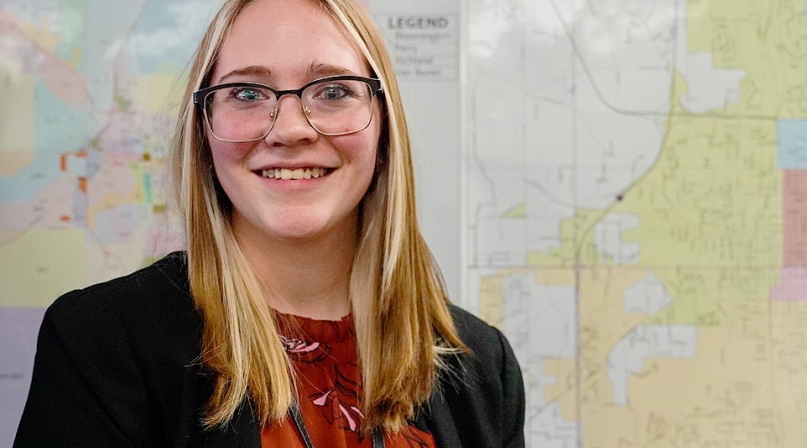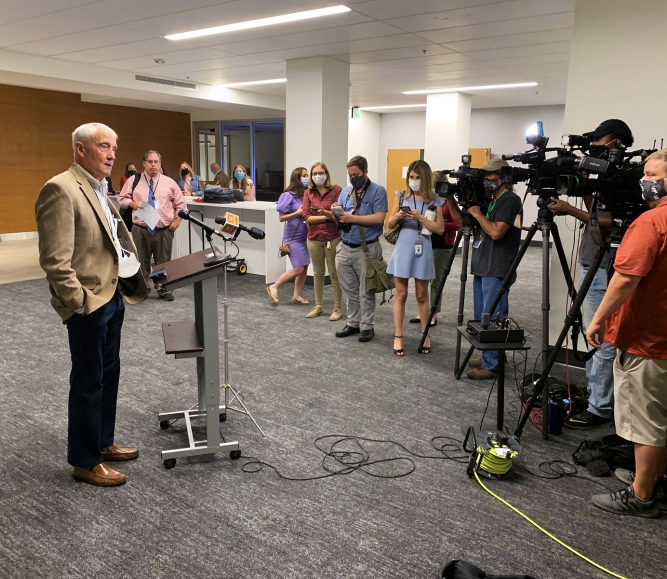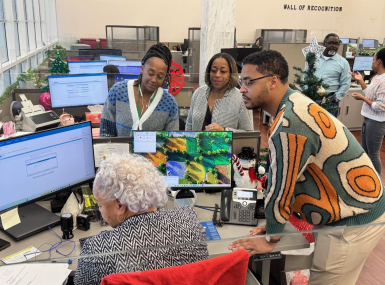Amid sea of resignations, an elections supervisor, 24, rises to the task

Kylie Moreland’s 25th birthday is coming up. She’ll be celebrating at the Indy 500 — but first, she has a presidential primary to oversee.
Following increased scrutiny around election security, counties across the country are facing a wave of resignations and early retirements from election officials. Monroe County, Ind. had a new election supervisor in the role nearly every other month over the last year prior to Moreland, a 24-year-old who grew up in the county, stepping into the top election official position in February.
Indiana’s primary is May 7, and early voting has been open since April 9. Monroe County is expecting its highest voter turnout in years, and early voting has exceeded the county’s expectations, with more than 2,000 voters already casting their ballots.
“My day-to-day right now is insane,” Moreland said.
As Monroe County’s elections supervisor, Moreland creates ballots, oversees election day training, files candidate paperwork and finance reports, sets up the voting locations and “makes sure everything is as public as possible, so that everybody knows what’s going on, when it’s going on and how it’s going on.” Monroe County also holds a public viewing of the ballot review.
“It’s taking care of every single little detail that it takes to put on an election,” Moreland said. “But also making sure that we have enough workers and that the workers are getting paid a certain amount and making sure they’re still coming back.”
Monroe County has struggled to retain election workers in recent years, Moreland said. The Election Board reached out to former election workers to find out why they weren’t returning. “For some of them, it was security, not knowing if they were going to be safe at the polling locations with it being a presidential election, not knowing what will happen, and the pay was also a really big thing,” she said.
Higher pay
Since becoming the county’s elections supervisor, Moreland has attended County Commissioners and County Council meetings to advocate for increased pay for election workers. The Monroe County Commissioners voted April 17 to increase Election Day poll worker wages, raising election inspector wages from up to $165 to up to $200. That “will help quite a bit” in attracting workers, Moreland said. Many counties throughout the state pay significantly more; Hamilton County offers inspectors $400.
Despite holding the top supervisor position at such a young age, Moreland wasn’t always interested in elections. She had originally applied for a position in the County Clerk’s Office, but after a handful of interviews, Monroe County Clerk Nicole Browne told her she thought she’d be a good fit for the elections supervisor assistant position, which she served in for five months before being promoted to supervisor.
“At first, I was a little nervous about it,” Moreland said. “Because I was like, ‘OK, I don’t really know a lot about of elections, but I’m up for the challenge.’ I knew the job wasn’t going to be easy, but I was excited for the challenge, and it makes it a lot easier that I really enjoy doing it.”
What she may lack in experience, Moreland said she makes up for in curiosity and dedication. She said the transition from assistant to supervisor has been “actually pretty easy,” because of how closely she worked with the former supervisor.
“One thing about me, I absolutely love learning something new all the time,” Moreland said. “And with elections, everything’s always changing. The rules, the regulations, the procedures, all of it is changing constantly.”
There has been an influx of legislation across the country in recent years aiming to increase election security, including in Indiana. The state passed legislation earlier this year adding an additional residency requirement for first-time voters; another law that passed last year tightened requirements around mail-in voting. While it’s going to make the process more difficult, it will help confirm voters actually live in Monroe County, Moreland said.
“The process is definitely going to change quite a bit,” Moreland said. “We’ve been used to people coming in, dropping off their voter registrations or just filling it out right there in the office, being done and leaving and they would be registered within the seven days. Now, it’s going to take that extra process of having residential confirmation and showing proof of address.”
Pageant queen duties prepared her for county position
Moreland participated in Monroe County’s 4-H leadership program for 10 years, but it was her time as a pageant queen that she feels best prepared her for working as the county’s elections supervisor. She said her time as the Monroe County Fall Festival queen strengthened her connection to the community. “When you’re in a title spot like that, you really learn how to communicate with anybody and everybody.”
“I have people that come to me about anything and everything,” Moreland said. “It could be the smallest thing or it could be the biggest thing — I’m the one that they come to, to ask questions, especially when it comes to early voting or Election Day … so it’s being able to connect with people of all ages, different races, different backgrounds.
“You have to be able to adapt to so many different types of people, especially with it being a college town.”
Recruiting at high schools
As someone who is nearly college-aged herself, Moreland has done extensive outreach to the youngest demographic of voters in the county, which is home to Indiana University. In an aging field where the average poll worker is 64, Moreland’s gone out to local high schools to recruit poll workers and spoken to university students to determine what the county can do to make it as convenient to vote as possible.
“A majority of the election base is people who are older who have been doing this for years,” Moreland said. “But me coming into this position, I’ve really been able to kind of give out my input on things and say, ‘Well, if we do it this way, I think it’ll be better, because of this reason,’ and they’re starting to see the other side of it.”
The county previously had an early voting location across from the bus station, with the idea that it would be easy for college students to access while they were already using public transportation. Moreland said that, in her conversations with students, she heard that many of them don’t use Bloomington Transit, so the county is working to transition to the Vote Center [where voters can vote anywhere, they don’t have to stick to their precinct] model, so that voters have more flexibility in where they’re able to cast their ballot.
“We also want to make sure that our elderly are able to get to these polling sites and that they are accessible to them,” she said. “It’s really important to us that it’s accessible for anybody and everybody.”
Social media: Help or hindrance?
Creating social media channels for the Elections Board, which currently has none, is another way Moreland wants to reach out to a younger audience.
“It will help them out a lot, knowing that they can easily just get on say, Tik Tok or Instagram or Facebook, and be able to see something that tells them, ‘OK, this is how you register to vote. You can go to this location, or you can click this link and register,’” Moreland said.
While social media can be a tool to encourage civic engagement, it’s also proven to be a double-edged sword for election workers; a former Monroe County Elections Supervisor, Karen Wheeler, who is 67, said social media is part of what she thinks is propelling the increased scrutiny of elections and is why many election officials across the country are resigning or retiring early.
“Social media has changed a lot of things,” Wheeler said. “You get a lot of input that wasn’t going on before, directly related to elections. People expressing their opinions, they don’t like something, no matter who’s running or who’s on the ballot, the workers get a lot of flak that way and the election supervisor really gets it all and you have to deal with it … It’s extremely stressful.”
Wheeler resigned after eight years in the position following scrutiny surrounding the county’s November 2022 general election, which had two recounts after roughly 6,600 ballots weren’t added to the election night total until the next morning.
Both recounts reflected the total of the initial count, according to Wheeler.
Although she stepped down from the elections supervisor role, Wheeler still works for the county, in the parks and recreation department, and volunteers to teach voter registration training.
Moreland’s little ‘stress relievers’
Moreland acknowledges the pressure of the election supervisor position, and said her children, who are 1 and 2, are her “stress relief.”
“When I get home at the end of the day, they come running up to me and they give me their hugs,” Moreland said. “And as soon as I walk through the door, it’s just that release of everything that I’ve been carrying that whole day.”
At the end of the day, it’s all about serving Monroe County in whatever way she can, Moreland said. While Moreland currently lives in neighboring Greene County, Monroe County is where she was raised and has “always been home” for her.
“I knew from a young age that I wanted to do something that would impact the future of my community, because of how much that I got from it,” Moreland said.
“Stepping into this position really gave me the opportunity to pay it back to my community and to tell them basically ‘Thank you for everything that you gave me growing up.’”
Related News

MEGA Act moves in House; NACo raises county concerns
On Feb. 10, the U.S. House Committee on Administration held a hearing to consider the Make Elections Great Again (MEGA) Act (H.R. 7300), which was introduced by Committee Chairman Rep. Bryan Steil (R-Wis).

House passes SAVE Act; Major impacts on county election administration
Next week, the U.S. House of Representatives is slated to vote on the Safeguarding American Voter Eligibility (SAVE) Act (H.R. 22), making it the chamber’s second vote on a version of the legislation in less than a year.
County News
A year later, 2020 hangs over county elections


